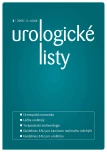Therapeutic endourology: ureteropelvic junction obstruction
Authors:
Mihir Desai 1; Bryan Hinck 2; Francis X. Keeley 3; Manoj Monga 2
Authors‘ workplace:
Cleveland Clinic
1; University of Minnesota
2; Bristol Urological Institute
3
Published in:
Urol List 2008; 6(3): 38-42
Overview
Endourology has an important role in the diagnosis and management of ureteropelvic junction obstruction. In this review article we discuss the evolution of this role in the face of developing laparoscopic and robotic techniques. We will discuss the relative advantages and disadvantages of balloon dilation; antegrade, retrograde or cutting balloon endopyelotomy; and open or laparoscopic pyeloplasty. We will discuss the current criteria for patient selection using endoscopic inspection and adjunctive imaging modalities, and provide a step-by-step discussion of both the antegrade and retrograde endoscopic approaches to management of this disease.
Key words:
ureteropelvic junction obstruction, endourology, ureteroscopy
Sources
1. Danuser H, Ackermann DK, Böhlen D, Studer UE. Endopyelotomy for primary ureteropelvic junction obstruction: risk factors determine the success rate. J Urol 1998; 159(1): 56–61.
2. Van Cangh PJ, Wilmart JF, Opsomer RJ et al. Long-term results and late recurrence after endoureteropyelotomy: a critical analysis of prognostic factors. J Urol 1994; 151(4): 934–937.
3. Conlin MJ, Bagley DH. Ureteroscopic endopyelotomy at a single setting. J Urol 1998; 159(3): 727–731.
4. Janetschek G, Peschel R, Altarac S, Bartsch G. Laparoscopic and retroperitoneoscopic repair of ureteropelvic junction obstruction. Urology 1996; 47(3): 311–316.
5. Moore RG, Averch TD, Schulam PG et al. Laparoscopic pyeloplasty: experience with the initial 30 cases. J Urol 1997; 157(2): 459–462.
6. Inglis JA, Tolley DA. Ureteroscopic pyelolysis for pelviureteric junction obstruction. Br J Urol 1986; 58(3): 250–252.
7. Meretyk I, Meretyk S, Clayman RV. Endopyelotomy: comparison of ureteroscopic retrograde and antegrade percutaneous techniques. J Urol 1992; 148(3): 775–782.
8. Van Cangh PJ, Nesa S, Galeon M et al. Vessels around the ureteropelvic junction: significance and imaging by conventional radiology. J Endourol 1996; 10(2): 111–119.
9. Martin X, Rouviere O. Radiologic evaluations affecting surgical technique in ureteropelvic junc-tion obstruction. Curr Opin Urol 2001; 11(2): 193–196.
10. Rouviere O, Lyonnet D, Berger P et al. Ureteropelvic junction obstruction: use of helical CT for preoperative assessment – comparison with intraarterial angiography. Radiology 1999; 213(3): 668 – 673.
11. Keeley FX, Moussa SA, Miller J, Tolley DA. A prospective study of endoluminal ultrasound versus computerised tomography angiography for detecting crossing vessels at the ureteropelvic junction. J Urol 1999; 162(6): 1938–1941.
12. Danuser H, Ackermann DK, Böhlen D, Studer UE. Endopyelotomy for primary ureteropelvic junction obstruction: risk factors determine the success rate. J Urol 1998; 159(1): 56–61.
13. Gupta M, Tuncay OL, Smith AD. Open surgical exploration after failed endopyelotomy: A 12-year perspective. J Urol 1997; 157(5): 1613–1619.
14. Nakada SY, Wolf JS Jr, Brink JA et al. Retrospective analysis of the effect of crossing vessels on successful retrograde endopyelotomy outcomes using spiral computerized tomography angiography. J Urol 1998; 159(1): 62–65.
15. Knudsen BE, Cook AJ, Watterson JD et al. Percutaneous antegrade endopyelotomy: long-term results from one institution. Urology 2004; 63(2): 230–234.
16. Ramsay JW, Miller RA, Kellett MJ et al. Percutaneous pyelolysis: indications, complications and results. Br J Urol 1984; 56(6): 586–588.
17. Badlani G, Eshghi M, Smith AD. Percutaneous surgery for ureteropelvic junction obstruction (endopyelotomy): technique and early results. J Urol 1986; 135(1): 26–28.
18. Savage SJ, Streem SB. Simplified approach to percutaneous endopyelotomy. Urology 2000; 56(5): 848–850.
19. Combe M, Gelet A, Abdelrahim AF et al. Ureteropelvic invagination procedure for endopyelotomy (Gelet technique): review of 51 consecutive cases. J Endourol 1996; 10(2): 153–157.
20. Ono Y, Ohshima S, Kinukawa T et al. Endopyeloureterotomy via a transpelvic extraureteral approach. J Urol 1992; 147(2): 352–355.
21. Oshinsky GS, Jarrett TW, Smith AD. New technique in managing ureteropelvic junction obstruction: percutaneous endoscopic pyeloplasty. J Endourol 1996; 10(2): 147–151.
22. Desai MM, Gill IS, Carvalhal EF et al. Percutaneous endopyeloplasty: a novel technique. J Endourol 2002; 16(7): 431–443.
23. Grasso M, Bagley D. Small diameter, actively deflectable, flexible ureteropyeloscopy. J Urol 1998; 160(5): 1648–1653.
24. Tawfiek ER, Liu J, Bagley DH. Ureteroscopic treatment of ureteropelvic junction obstruction. J Urol 1998; 160(5): 1643–1647.
Labels
Paediatric urologist UrologyArticle was published in
Urological Journal

2008 Issue 3
-
All articles in this issue
- Ureteropelvic junction stenosis - antegrade and retrograde endopyelotomy, laparoscopic pyeloplasty. Right indication, pros and cons
- Therapeutic endourology: upper tract transitional cell carcinoma
- Combination treatment of BPH - an update
- Orthotopic neobladder – an update
- Current indications of extracorporeal shock wawe litho tripsy urolithiasis treatment - what has been changed?
- Current scope of ureteroscopy
- Renal calculi burden – percutaneous lithitripsy or retrograde surgery?
- Therapeutic endourology: ureteropelvic junction obstruction
- Urological Journal
- Journal archive
- Current issue
- About the journal
Most read in this issue
- Ureteropelvic junction stenosis - antegrade and retrograde endopyelotomy, laparoscopic pyeloplasty. Right indication, pros and cons
- Current scope of ureteroscopy
- Renal calculi burden – percutaneous lithitripsy or retrograde surgery?
- Orthotopic neobladder – an update
